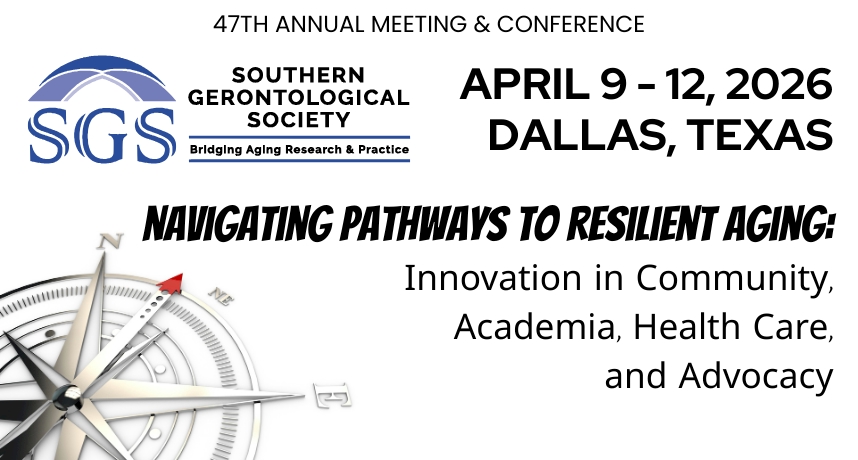SGS Annual Conference
2026 SGS Annual Meeting & Conference

The Southern Gerontological Society’s 47th Annual Meeting and Conference
Navigating Pathways To Resilient Aging: Innovation in Community, Academia, Health Care, and Advocacy
Hyatt Regency Dallas
300 Reunion Boulevard
Dallas, TX 75207
April 9 through April 12, 2026
Are you interested in presenting at our Annual Meeting & Conference? Our Call for Abstracts will close on 11:59 PM Central Time on January 12, 2026. Please visit our Call for Abstracts page for more information on how to submit your abstract.
The Southern Gerontological Society (SGS), established in 1979, is a network of the South's most respected gerontology professionals, representing 14 southern states and the District of Columbia. The mission of SGS is to provide the bridge between research and practice, translating and applying knowledge in the field of aging. The SGS Annual Meeting and Conference focuses on advances in gerontological research and applied practice, bringing together those engaged in the field of aging to attend and/or present their latest research, programs, interventions, and workshops. The conference will include keynote speakers, panel symposia, workshops, best practices discussions, and both paper and poster sessions. Anyone with an interest in aging is encouraged to attend.
SGS is proud to partner with the Dallas Public Library and Vivid-Pix to host Better Together: A Wellness Gathering, a half-day educational event for older adults and the community.
An Invitation from the SGS President
The Southern Gerontological Society's 47th Annual Meeting & Conference will be held in the historic city of Dallas, Texas. Our theme is Navigating Pathways to Resilient Aging: Innovation in Community, Academia, Health Care and Advocacy. As president of the Southern Gerontological Society, I would like to extend an invitation for you to attend and contribute to our meeting being held on April 9-12, 2026.

Known for its dynamic blend of modern urban energy, rich history, and diverse culture, conference-goers can expect a warm reception from locals, great food, and a generally positive environment for both learning and networking.
Dallas embodies a mix of Southern hospitality and modern ambition. It’s often described as bold, business-minded, and ever-growing, with a growing emphasis on diversity, innovation, and urban revitalization. Iconic and instantly recognizable, featuring landmarks like Reunion Tower, Bank of America Plaza, and Fountain Place.
SGS is proud to partner with the Dallas Public Library and Vivid-Pix to host Better Together: A Wellness Gathering, a half day educational event for older adults and the community on April 9th. Our Annual Meeting & Conference will officially kick off at 2:00 PM where I will welcome attendees with a President’s Opening, followed by the first of many informative and exciting concurrent sessions and ending with the first of two Poster Sessions.
On Friday, April 10th, we will continue to learn from one another during concurrent sessions as well as a dynamic keynote lunch and our second Poster Session. We will also enjoy networking with one another during our traditional Dine Arounds. On Saturday, April 11th, we will highlight the work of SGS during our Annual Meeting Breakfast and the work of deserving colleagues and organizations during our Awards lunch. We will end our conference on Sunday, April 12th with a fun and interactive closing session.
Connecting communities with older adults is crucial for several reasons, as it fosters mutual benefit, strengthens societal bonds, and addresses critical challenges that both groups face. The conference presentations will address many of these challenges such as 1) combating loneliness and isolation; 2) intergenerational learning; 3) building stronger social relationships; 4) promoting health and well-being and 5) addressing ageism and misconceptions.
Like previous years, we are organizing the conference into five domains. We organized themes to drive session creation in ways that ensure that researchers, practitioners, policy advocates, and older adult consumers create linkages in terms of networks, sharing ideas to forward the agenda of connecting communities and improving older adult quality of life. The DOMAINS are (1) Age-related Health and Wellness, (2) Diversity Topics in Aging Communities, (3) Caregiving, Care Support, and Care Partnerships, (4) Gerontological Education and Professional Development, and (5) Advocacy for or by Older Adults. We hope you will join us and share your important work at the Dallas, TX meeting.
Sincerely,
Ethlyn McQueen-Gibson, DNP, MSN, RN-BC
President, SGS (2024-2026)
